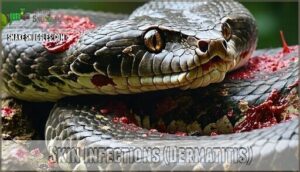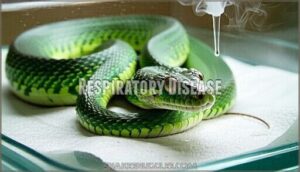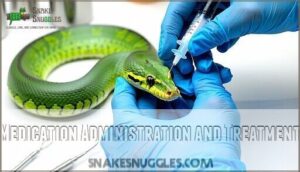This site is supported by our readers. We may earn a commission, at no cost to you, if you purchase through links.

Your scaly friend can’t tell you when something’s wrong, so watch for appetite changes, unusual behavior, mouth discharge, or breathing issues.
Common problems include mouth rot, parasites, skin infections, and respiratory disease.
Think of your vet as your snake’s translator – they speak "python" when you don’t.
Maintaining proper temperature, humidity, and cleanliness prevents most health issues.
Finding the right reptile vet before problems arise is like having insurance for your slithery companion.
Understanding what keeps snakes healthy involves more than just feeding mice and hoping for the best, it requires a deeper understanding of their needs, including proper care and regular check-ups with a reptile-experienced veterinarian to ensure the health and well-being of your snake.
Table Of Contents
- Key Takeaways
- Choosing The Right Veterinarian
- Common Health Issues in Snakes
- Recognizing Signs of Illness in Snakes
- Providing Proper Care and Nutrition
- Medication Administration and Treatment
- Creating a Healthy Environment
- Preventing The Spread of Disease
- Frequently Asked Questions (FAQs)
- Do snakes need veterinary care?
- What is pet snake health?
- How do you care for a pet snake?
- What should I do if my snake is sick?
- Do pet snakes need a health check?
- How do you master the art of pet snake wellness?
- What vet care do snakes need?
- How much does a vet visit cost for a snake?
- Do snakes need regular vet checkups?
- How much does it cost to take a snake to the vet?
- Conclusion
Key Takeaways
- You’ll need a reptile-experienced veterinarian since regular vets often lack the specialized knowledge to properly diagnose and treat snake-specific conditions like respiratory infections and mouth rot.
- Watch for early warning signs like appetite changes, lethargy, breathing issues, or unusual discharge – snakes hide illness well, so catching problems early prevents serious complications.
- Maintain proper environmental conditions with correct temperature gradients, humidity levels, and clean enclosures to prevent most health issues before they start.
- Schedule annual checkups with your reptile vet for parasite screenings and health monitoring, since preventive care costs far less than emergency treatments.
Choosing The Right Veterinarian
Finding the right veterinarian for your snake isn’t like picking a doctor for your dog – most small animal vets don’t have the specialized training needed for reptiles.
Your snake needs a specialist who speaks reptile, not just animal.
You’ll want to search for a herp vet or exotic animal specialist who actually knows the difference between a respiratory infection and normal snake behavior, which can be a respiratory infection.
Specialized Veterinary Care for Snakes
Finding specialized veterinary care for your snake isn’t just important—it’s absolutely vital.
Only 15% of U.S. veterinary clinics provide exotic animal care, making the right reptile vet a rare gem. Your snake deserves someone who truly understands their unique needs.
Here’s what makes a great snake veterinarian:
- Board certification in reptile medicine with advanced training beyond general practice
- Specialized diagnostic equipment like micro-hematocrit centrifuges for small blood samples
- Experience with snake-specific conditions including inclusion body disease and respiratory infections
- Proper restraint techniques using transparent tubes to minimize stress during exams
Exotic animal vets who specialize in reptile clinic care offer annual health exams and antiparasitic treatments that regular vets simply can’t match.
Experience With Reptile Handling and Treatment
Your snake deserves a veterinarian who can handle them like a pro, not someone who treats them like a dangerous rope.
Look for experience with safe handling techniques and stress reduction methods.
The right reptile vet understands species differences and bite prevention strategies.
| Handling Aspect | Inexperienced Vet | Experienced Reptile Vet |
|---|---|---|
| Snake Restraint | Awkward, stressed handling | Confident, calm techniques |
| Stress Response | High anxiety for snake | Minimal stress, quick procedures |
| Safety Measures | Basic precautions only | Specialized bite prevention protocols |
| Species Knowledge | One-size-fits-all approach | Customized handling techniques per species |
Experienced reptile handling makes all the difference in snake veterinary care and snake health outcomes.
Understanding Reptile-Specific Medical Needs
Your reptile vet needs specialized knowledge that goes beyond basic animal care.
Reptile physiology differs dramatically from mammals—their unique anatomy requires different anesthesia concerns and herp pharmacology approaches.
A qualified reptile vet understands specialized diagnostics for snake diseases and knows how temperature affects medication absorption.
Without this expertise, even well-meaning treatment can harm your snake’s reptile health through improper snake care protocols.
Researching Local Veterinarians and Their Experience
Researching the right reptile vet takes some detective work, but it’s worth the effort. Start by checking certifications and exotic vet training credentials.
Next, read online reviews from other snake owners about clinic facilities and handling comfort. Then, call potential veterinarians to assess their communication skills and reptile specialization experience.
Finally, visit clinics to observe their setup and staff interaction with reptiles before making your choice. Consider using online directories to find reptile specialists.
- Verify exotic vet certifications and reptile specialization training
- Read online reviews focusing on snake veterinarian experiences
- Evaluate communication skills through initial phone consultations
- Visit clinic facilities to assess reptile handling comfort levels
Common Health Issues in Snakes
Snake owners often wonder which health problems they should watch for in their pets.
Understanding common snake diseases helps you spot trouble early and get your snake the care it needs before minor issues become serious problems.
Infectious Stomatitis (Mouth Rot)
Mouth rot hits when bacteria invade your snake’s oral cavity, causing swollen, infected gums and that telltale foul smell.
Poor oral hygiene and dirty enclosures create perfect breeding grounds for infectious stomatitis. Watch for red, swollen tissue and thick discharge around the mouth.
Stomatitis treatment options include antibiotics and thorough cleaning, but preventative measures work best. Keep temperatures consistent, maintain proper humidity, and sanitize regularly.
Without prompt snake veterinary care, this snake infection can lead to serious secondary infections that threaten your pet’s overall snake health.
Parasites (Internal and External)
While mouth rot affects the oral cavity, parasites pose a different threat throughout your snake’s body.
These tiny troublemakers come in two main varieties: external pests like snake mites and ticks, plus internal worms and protozoal infections.
Mite prevention starts with quarantining new snakes and maintaining clean enclosures.
Fecal exams help detect internal parasites early, while deworming schedules keep worm populations in check.
External parasite control involves regular habitat cleaning and monitoring for mite infestations – these bloodsuckers can quickly overwhelm your pet.
Tick removal requires careful technique to avoid leaving mouthparts behind.
Skin Infections (Dermatitis)
Damp, dirty conditions create the perfect breeding ground for dermatitis in snakes.
Identifying dermatitis starts with spotting red, swollen patches on your snake’s skin.
Treating dermatitis requires immediate veterinary attention and antibiotics.
Preventing dermatitis means maintaining proper humidity levels and snake hygiene.
Clean substrates regularly to avoid snake infection and support overall snake health.
Respiratory Disease
While skin problems affect the outside, breathing issues go straight to your snake’s core.
Respiratory disease hits hard when bacteria, viruses, or environmental irritants attack your pet’s lungs.
Bacterial pneumonia and fungal infections are common culprits that need immediate reptile vet attention.
Watch for these warning signs:
- Wheezing, gurgling, or whistling sounds during breathing
- Excess mucus or nasal discharge around the nostrils
- Mouth breathing or difficulty getting air
- Lethargy combined with loss of appetite
Environmental irritants like dusty substrate or poor ventilation often trigger these respiratory infection signs.
Your snake veterinary care plan might include nebulization therapy to help clear airways.
Don’t ignore aspiration risk from improper feeding – it can worsen snake health quickly.
Proper care is essential to prevent and manage these conditions, ensuring the overall health and well-being of your pet snake, and immediate attention is crucial when symptoms arise.
Viral Diseases (Inclusion Body Disease)
Sadly, viral diseases like inclusion body disease devastate snake collections.
IBD symptoms include head tremors, stargazing, and regurgitation—especially severe in pythons.
Your reptile vet performs IBD diagnosis through specialized blood tests detecting arenavirus RNA.
Unfortunately, IBD research shows no cure exists.
| What You See | What It Means |
|---|---|
| Head tremors, corkscrewing | Neurological damage progressing |
| Sudden weight loss | Disease attacking organs |
| Regurgitation episodes | Digestive system failing |
| Stargazing behavior | Central nervous system compromised |
IBD transmission spreads through mites and direct contact.
IBD prevention requires strict quarantine and snake veterinary care monitoring for early snake illness detection.
Recognizing Signs of Illness in Snakes
You’ll spot a sick snake faster when you know what warning signs to watch for.
Early detection can mean the difference between a quick recovery and a serious health crisis that requires emergency veterinary care.
Behavioral Changes (Loss of Appetite, Lethargy)
Snakes often hide illness until it’s serious, making behavioral changes your first warning sign.
Watch for appetite loss causes like stress or temperature issues, and lethargy indicators such as excessive hiding behavior or reduced activity level.
Unusual aggression can also signal discomfort.
Trust your instincts—when snake behavior monitoring reveals changes, contact your vet immediately for proper snake health assessment.
Physical Symptoms (Discharge, Swelling, Lesions)
When examining your snake’s skin, watch for telltale physical symptoms that signal health problems.
Discharge Types like mucus or pus often indicate infections requiring immediate attention. Look for these critical warning signs:
- Nasal or oral discharge – Clear to yellow mucus suggests respiratory issues
- Swelling Causes – Inflamed areas may indicate abscesses or injuries
- Lesion Identification – Open wounds, ulcers, or discolored patches need prompt care
- Scale Abnormalities – Crusty, peeling, or damaged scales suggest skin infections
Early detection prevents serious complications in snake health management.
Environmental Factors (Temperature, Humidity, Lighting)
Your snake’s environment directly impacts snake health more than you’d think.
Temperature control through proper thermal gradients lets your pet thermoregulate naturally—think warm basking spots and cooler retreats.
Humidity control prevents shedding issues and respiratory problems.
Consistent lighting schedules support natural behaviors.
Poor humidity levels or inadequate heating often trigger illness before obvious symptoms appear.
Monitor these environmental factors closely—they’re your first defense against snake environment problems requiring veterinary intervention.
Monitoring Health and Detecting Early Warning Signs
A watchful eye prevents serious snake health problems from sneaking up on you.
Regular observation helps you catch snake symptoms before they become dangerous. Notice appetite changes, unusual behavioral changes, or lethargy signs immediately. Shedding issues and physical abnormalities also signal trouble brewing.
- Monitor eating habits – sick snakes often refuse food first
- Check for discharge from eyes, nose, or mouth regularly
- Watch movement patterns – healthy snakes stay alert and active
- Schedule fecal analysis if bowel movements look abnormal
Providing Proper Care and Nutrition
Your snake’s health depends on getting the basics right from day one.
Proper nutrition and a well-maintained environment work together like a safety net, catching problems before they become expensive vet visits.
Dietary Needs (Live Insects, Vegetables, Commercial Food)
Feeding your snake properly isn’t rocket science, but getting it wrong can spell trouble. Snakes are obligate carnivores, meaning they need animal-based diets to survive.
Most pet snakes thrive on rodents like mice or rats, with prey size matching your snake’s widest body part. Feeding frequency depends on age—juveniles eat weekly, adults every 10-14 days.
Always make certain water availability with clean bowls for drinking and soaking. Avoid supplementation unless prescribed by your vet, and monitor portions to prevent obesity prevention issues.
Many owners find it convenient to purchase pre-killed rodents for their snakes.
- Choose frozen-thawed rodents over live prey to reduce injury risk
- Select appropriate prey size – no larger than your snake’s thickest point
- Maintain consistent feeding schedules based on your snake’s age and species
- Provide fresh water daily in bowls large enough for soaking
Environmental Requirements (Heating, Lighting, Humidity)
Creating the right environment is like being your snake’s personal climate control specialist.
You’ll need proper temperature gradient zones with basking spots around 88-92°F and cool areas at 78-80°F. Thermostat control prevents dangerous overheating.
Humidity levels should match your species’ needs – typically 50-60% for most snakes. Consider snake habitat products to help maintain ideal conditions.
UVB lighting cycles help with calcium absorption, while adequate enclosure size gives room to thermoregulate naturally.
Enclosure Design and Maintenance
Proper enclosure size gives your snake room to stretch and thrive.
Design includes secure hiding spots, sturdy climbing branches for arboreal species, and easy water access.
Choose appropriate substrates and add enrichment items for mental stimulation.
Your snake habitat needs regular cleaning and substrate replacement to maintain ideal snake temperature and snake humidity levels.
- Spacious hideouts make your snake feel secure and reduce stress
- Natural climbing structures encourage healthy exercise and exploration
- Easy-to-clean substrates save you time while keeping things fresh
- Interactive enrichment keeps your slithery friend mentally engaged and happy
Preventing Health Problems Through Good Hygiene
Good hand hygiene prevents cross-contamination between you and your snake. Always wash hands before and after handling.
Enclosure sanitation involves weekly cage cleaning with reptile-safe disinfectants. Safe handling techniques reduce stress and disease spread.
Maintain water quality by changing bowls twice weekly. Prompt waste removal prevents bacterial growth.
Clean disinfecting equipment after each use to maintain superior snake health and prevent illness.
Medication Administration and Treatment
When your snake needs medical treatment, you’ll work closely with your vet to give medications properly and safely.
Getting the dosage and timing right is essential—too little won’t help, and too much can harm your scaly friend.
Injectable Antibiotics and Medications
When your snake needs injectable antibiotics, think of it like precision medicine—every detail matters for your pet’s recovery.
- Injection sites: Your vet will target specific muscle groups, typically the back third of your snake’s body, avoiding essential organs and ensuring proper absorption of the medication.
- Dosage calculation: Snake medication requires weight-based formulas since overdosing can cause serious side effects while underdosing won’t clear the infection effectively.
- Antibiotic types: Different bacterial infections need specific treatments, from broad-spectrum options to targeted antibiotics, with pain management considerations throughout the process. For severe cases, ceftazidime can be effective.
Oral Medications and Assisted Feeding
Administering oral medications to your snake isn’t rocket science, but it takes patience.
Pills vs. liquids depends on your vet’s preference and your snake’s condition.
For stubborn patients, assisted feeding using gavage technique or tube feeding guarantees proper medication administration.
Appetite stimulants and hydration methods support recovery.
Always follow your vet’s dosing instructions for the best snake health.
Intravenous Injections and Hospitalization
When oral medications fall short, intravenous injections become your snake’s lifeline.
IV Catheter Placement targets the ventral tail vein for Fluid Therapy and Critical Care. Snake Anesthesia helps with difficult procedures.
For smaller snakes, subcutaneous injections are often the preferred method.
Hospitalization provides continuous Post-Op Monitoring and professional medication administration—your snake’s health insurance policy when things get serious.
Importance of Proper Dosage and Frequency
Precision matters when giving your snake medication – think of it like following a recipe where measuring cups can’t be "close enough."
Your vet calculates dosages based on your snake’s weight and species because reptile metabolism works differently than mammals.
Missing doses or stopping treatment early can create antibiotic-resistant bacteria, while overdosing risks toxicity that could harm your pet more than help.
- Follow dosage accuracy – Use syringes or measuring tools provided by your vet for precise amounts
- Stick to frequency adherence – Set phone alarms to maintain consistent timing between doses
- Complete treatment duration – Finish the entire course even if your snake seems better
- Watch for toxicity risks – Monitor for unusual behavior that might indicate medication problems
Creating a Healthy Environment
Your snake’s environment directly impacts its health more than you might think. Getting the basics right—from cleaning schedules to proper lighting—prevents most common health problems before they start.
A clean habitat is your snake’s best medicine—prevention beats treatment every time.
Cage Cleaning and Disinfection
Regular cleaning keeps dangerous bacteria away from your snake’s home.
Use safe disinfectants like diluted bleach solutions for thorough substrate sanitation.
Create a cleaning schedule for daily waste removal and weekly deep cleans.
Good hygiene prevents cross-contamination between enclosures.
Don’t forget water sanitation – change it frequently to maintain proper snake hygiene.
A vital step involves replacing soiled substrate to prevent bacterial growth.
Substrate Choice and Replacement
The right snake substrate keeps your pet healthy and your snake enclosure clean.
Naturalistic substrates like aspen shavings or cypress mulch work great for burrowing needs while supporting humidity retention.
Paper towels offer easy substrate sanitation but lack natural appeal.
Cost analysis shows aspen provides the best balance of affordability and function.
Many keepers source their snake enclosure bedding from online retailers.
Replace substrate when soiled or every 4-6 weeks to prevent bacteria buildup.
Temperature and Humidity Control
Temperature control acts like your snake’s internal thermostat—get it wrong, and health problems follow quickly. Create a thermal gradient with your basking spot reaching 88-92°F while the cool side stays 78-82°F. Humidity levels should hover around 50-60% to prevent shedding issues.
Essential monitoring equipment for your snake enclosure:
- Digital thermometer with probes for both sides of your snake tank
- Hygrometer to track humidity levels precisely
- Thermostat to maintain consistent temperature gradient
- Infrared temperature gun for spot-checking surfaces
- Data logger to record daily fluctuations automatically.
Proper snake care means checking these readings daily—your pet can’t tell you when something’s off.
Lighting and UVB Requirements
Your snake’s lighting needs more thought than just flipping a switch.
UVB lighting helps your reptile synthesize vitamin D3, boosting calcium absorption and preventing metabolic bone disease.
Proper lighting can also help replicate the snake’s natural light cycle.
Position UVB bulbs twelve inches above basking spots for safe exposure.
Maintain lighting duration of ten to twelve hours daily using timers.
Full light spectrum supports natural behaviors while preventing respiratory infections.
Consult your reptile vet about species-specific requirements.
Preventing The Spread of Disease
When you bring a new snake home, that thirty-day quarantine period isn’t just a suggestion—it’s your first line of defense against turning your collection into a sick ward.
Smart snake keepers treat disease prevention like a chess game, thinking several moves ahead with proper quarantine, species separation, and rock-solid hygiene practices.
Quarantine Procedures for New Snakes
Beyond creating the perfect environment, proper isolation period length matters when bringing home new snakes.
You’ll need quarantine procedures that protect your existing collection. Here’s your snake care checklist:
- Set up separate quarantine setup away from other reptiles
- Monitor new arrivals daily for 30 days minimum
- Watch for preventing transmission signs like mites or illness
- Focus on stress reduction with proper temps and hiding spots
This isolation period helps your snake veterinarian catch problems early while keeping everyone safe.
Separating Species to Prevent Cross-Contamination
Once you’ve established quarantine procedures, housing different snake species separately becomes your next line of defense. Mixed-Species Risks include Species-Specific Pathogens that one species carries harmlessly but proves deadly to another.
Smart separation offers Quarantine Benefits like Reduced Stress and enhanced Disease Prevention.
| Risk Factor | Prevention Method |
|---|---|
| Cross-species disease transmission | Dedicated enclosures per species |
| Shared equipment contamination | Species-specific tools and supplies |
| Stress from incompatible neighbors | Individual housing arrangements |
| Pathogen buildup in shared spaces | Separate cleaning schedules |
| Emergency treatment complications | Species-specific medical protocols |
Think of it like keeping your cat away from your fish tank – some roommates just don’t mix well! This approach supports overall snake health and makes snake veterinary care more effective.
Disinfecting Equipment and Enclosures
After keeping species separate, proper disinfection becomes your snake home’s best defense against crosscontamination.
Clean your snake habitat regularly with safe disinfectants to maintain good hygiene and prevent disease spread.
Here’s your cleaning game plan:
- Use reptile-safe disinfectants or diluted bleach solution for cage cleaning
- Clean water bowls weekly to maintain proper water bowl hygiene
- Replace substrate monthly for thorough substrate sanitation
- Disinfect quarantine tank cleaning tools between each use
- Maintain consistent cleaning frequency based on your snake’s needs
This plan is crucial for preventing disease spread and ensuring the health of your snake, through regular cleaning and hygiene maintenance.
Practicing Good Hygiene and Handling Techniques
Your hands are your snake’s first line of defense against disease. Proper handwashing procedures before and after handling prevent cross-contamination between your pet and other animals. Good hygiene protects both you and your snake.
Follow these safe handling practices:
- Wash hands thoroughly with antibacterial soap before and after contact
- Use snake hooks when moving defensive or stressed snakes safely
- Avoid handling for 48 hours after feeding to prevent regurgitation
These handling techniques keep your snake healthy while maintaining proper snake veterinary care standards. To prevent startling, approach them with slow, deliberate movements.
Frequently Asked Questions (FAQs)
Do snakes need veterinary care?
Yes, snakes definitely need veterinary care.
You’ll want to find a reptile-specialized vet for annual check-ups, parasite screenings, and treating health issues.
Like respiratory infections or mouth rot that snakes commonly develop.
What is pet snake health?
Pet snake health means monitoring your snake’s eating habits, behavior, and physical condition regularly.
You’ll watch for signs like lethargy, breathing issues, or skin problems that signal illness requiring veterinary attention, which is crucial for maintaining your snake’s overall health.
How do you care for a pet snake?
Like tending a garden, you’ll nurture your snake’s world carefully.
Provide proper heating, humidity, and secure enclosure.
Feed frozen-thawed rodents appropriately sized for your snake’s girth every week or two, depending on age, to ensure a healthy environment for your pet.
What should I do if my snake is sick?
Contact a reptile veterinarian immediately if you notice symptoms like wheezing, mouth swelling, lethargy, or appetite loss.
Don’t wait – snakes hide illness until advanced stages, making quick professional care essential.
Do pet snakes need a health check?
Annual checkups with a reptile veterinarian are essential for detecting parasites, evaluating nutrition, and catching hidden diseases early. Snakes hide illness well, so regular exams keep them healthy.
How do you master the art of pet snake wellness?
Studies show 80% of snake health issues stem from poor husbandry.
You’ll master wellness by maintaining proper temperatures, humidity levels, feeding schedules, and finding an experienced reptile veterinarian for annual checkups and early problem detection, which leads to better wellness.
What vet care do snakes need?
Snakes need annual checkups with a reptile-experienced veterinarian for parasite testing, health monitoring, and early disease detection. Regular fecal exams catch internal parasites before they become serious problems.
How much does a vet visit cost for a snake?
Wallet-friendly checkups typically run $75-150, but don’t let sticker shock bite you. Emergency visits can climb higher, so finding an experienced reptile vet beforehand saves money and stress later.
Do snakes need regular vet checkups?
Yes, you’ll want to schedule annual checkups for your snake.
Regular vet visits help catch health problems early, check for parasites, and guarantee proper nutrition—preventing serious issues down the road.
How much does it cost to take a snake to the vet?
Basic checkups typically run $50-100, while emergency visits can cost $200- Complex treatments or surgeries may reach $500-1,000+. Many exotic vets charge consultation fees around $75-150 for routine snake examinations.
Conclusion
Like Aesculapius tending to ancient ailments, you’ll find that proper snake health veterinary care requires dedication and expertise.
Your scaly companion depends on you to recognize early warning signs and maintain ideal living conditions.
Regular check-ups with a reptile-experienced veterinarian, combined with proper husbandry practices, prevent most health problems before they start.
Remember, prevention beats treatment every time, and with the right knowledge and professional support, you’re equipped to keep your snake thriving for years to come.
- https://vcahospitals.com/know-your-pet/snakes-diseases
- https://www.vettimes.com/clinical/exotics/snakes-husbandry-and-common-health-problems-cpdreptiles
- https://www.hvsevet.com/blog/33/the-most-common-veterinary-issues-with-snakes
- https://www.northgatepetclinic.com/services/snake-wellness
- https://www.merckvetmanual.com/all-other-pets/reptiles/routine-health-care-of-reptiles



















